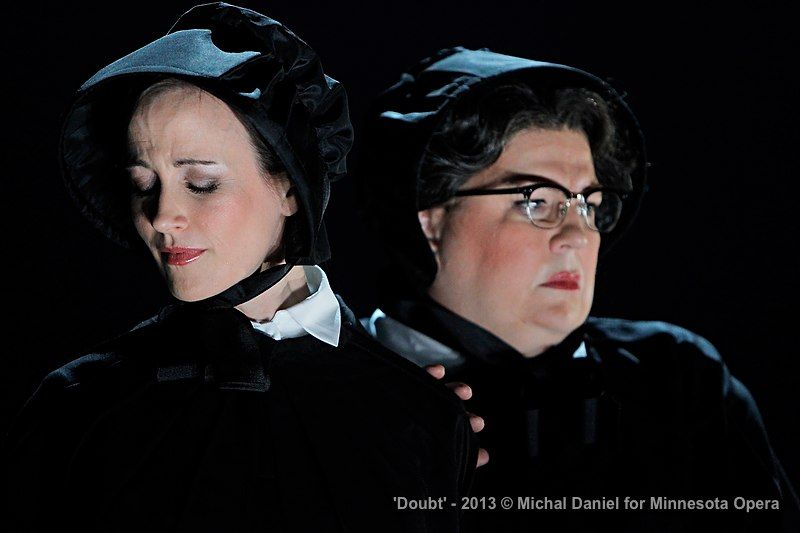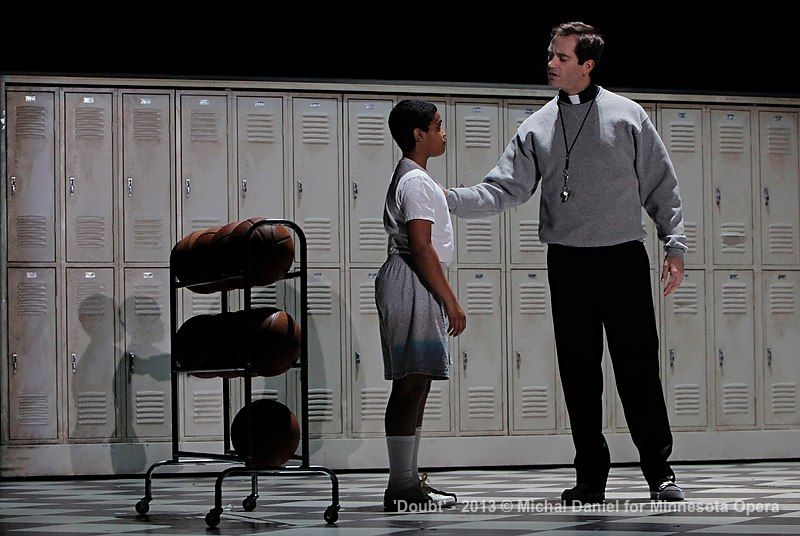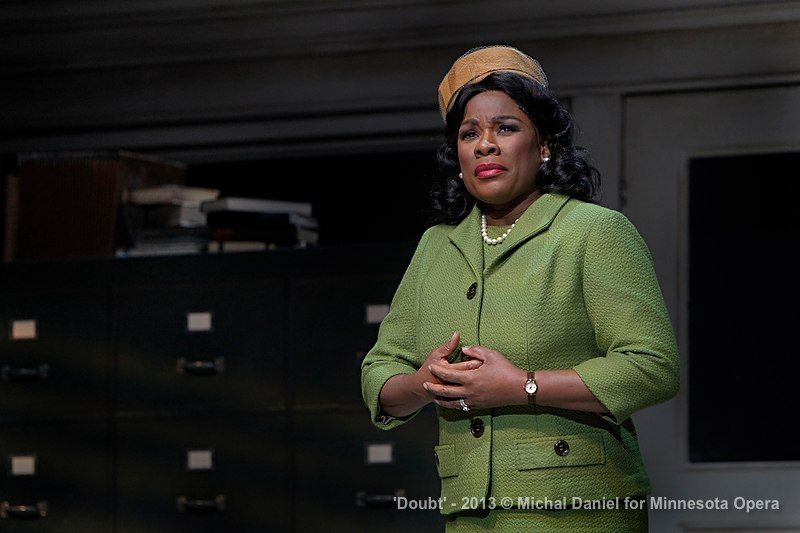
Minnesota Opera gives voice to “Doubt,” a new opera based on the play and film by John Patrick Shanley
Minnesota Opera’s iteration of John Patrick Shanley’s “Doubt” is not a comfortable production to watch. The newly commissioned opera, with a libretto written by Shanley himself and music by Douglas Cuomo, is the fifth to come from the company’s New Works Initiative program thus far. And while this new production is compelling throughout, it’s also thoroughly unsettling. I suspect that’s mostly by design.
Sister James (Adriana Zabala) and Sister Aloysius (Christine Brewer). Photo: Michal Daniel, courtesy of Minnesota Opera
Given that the various incarnations of “Doubt” have met with such well-publicized success on stage and screen, the bones of Shanley’s provocative “parable” are likely already familiar to most of you. Set shortly after John F. Kennedy’s assassination, the time is 1964 in a small Bronx parish and Catholic school; the story centers on Father Brendan Flynn, a young, post-Vatican II priest. Progressive and charismatic, Father Flynn is dedicated to making the relationship between the church and its faithful more intimate; for those efforts and his easy affability, he’s admired by his fellow priests, the schoolchildren and his parishioners. Only Sister Aloysius is resistant to his charms: highly starched and deeply conservative, she’s the formidable nun who serves as principal of the school. Innocent and idealistic, Sister James is a history teacher there, whose concerns about the priest’s recent encounter with a student, Donald Miller – the school’s first African-American pupil – confirm Sister Aloysius’ unproven but firm conviction that Father Flynn is an unchecked, unrecognized predator in their midst, exploiting the children in her charge.
Father Flynn (Matthew Worth) with Donald Miller (Julius Andrews). Photo: Michal Daniel, courtesy of Minnesota Opera
The text of the piece – much of it lifted directly from Shanley’s Oscar-nominated screenplay – is witty and smart and subtle, but also dense: the dialogue comes in a torrent through the two-and-a-half hour show. That ceaseless lyrical flow allows the production’s talented singers little room to breathe, much less soar. It’s like listening to unrelenting recitative; the anticipation of respite and aesthetic resolution promised by an aria builds and builds, but is never satisfied.
The sounds coming from the orchestra pit are moody and perfectly evocative of the larger story, with phrasing and melodic lines accented with clever nods to jazz, the Broadway songbook and classic film. But rather than supporting the singers, Douglas Cuomo’s instrumental scoring seems to run its own separate course, on a parallel (and sometimes competing) musical track from that of the libretto. The effect of hearing voice and orchestra, overlaid, is often discombobulating, discordant – faithful to the spirit of the story, perhaps, but off-kilter to the ear.
A sermon on gossip. Photo: Michal Daniel, courtesy of Minnesota Opera
To be fair, the vocalists pull off their respective roles beautifully – no mean feat, given the formidable range and lyrical requirements of this score. Soprano Christine Brewer makes a marvelous Sister Aloysius – rigid, yes, but also decent and wryly funny; the warmth of Brewer’s tone and the narrative sensitivity of her phrasing lend the role unexpected texture and depths of compassion. Baritone Matthew Worth is equally convincing as Father Flynn – he’s dashing and seductive, but also in fleeting but persuasive moments more than a little creepy. Another soprano, Adriana Zabala, holds her own as Sister James, playing her as self-consciously innocent, but not harmless. Finally, a small part, but among the most memorable in this production: mezzo Denyce Graves, as Donald Miller’s mother, gives a searing performance in what may well be the closest thing this opera has to a full-blown aria.
With the support of both children’s choir and a small chorus of adult parishioners, the vocals throughout are ably executed, but disquieting, too. The high, soprano-on-soprano tessitura, lovely vocals or not, skews shrill over the course of the work, in a way that underscores the disconcerting, increasingly hostile interplay and revelation among the characters.
Mrs. Miller (Denyce Graves). Photo: Michal Daniel, courtesy of Minnesota Opera
Minnesota Opera’s “Doubt” is beautifully produced, if not beautiful. The opera effectively evinces its difficult subject matter because it’s not easy — neither easy on the ear, nor on the heart and mind. And I love this company for taking that risk, for championing such a meaty, challenging project and seeing it through to fruition with flair and commitment.
“Doubt,” a new commission by Minnesota Opera (a Knight Arts grantee), with libretto by John Patrick Shanley and music by Douglas Cuomo, will run through February 3 at the Ordway Center for Performing Arts, 345 Washington St., St. Paul. For ticket details and additional information: http://www.mnopera.org/season/2012-2013/doubt
Recent Content
-
Artsarticle ·
-
Artsarticle ·
-
Artsarticle ·




